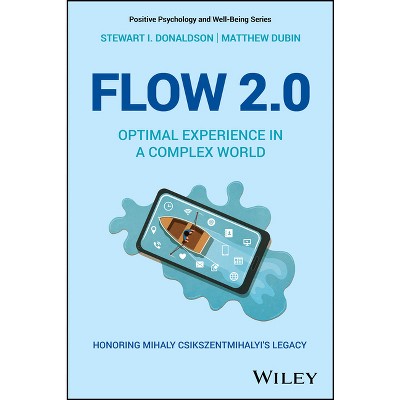Sponsored

A Psychology of Hope - by Kalman J Kaplan & Matthew B Schwartz (Hardcover)
In Stock
Sponsored
About this item
Highlights
- This book offers a new approach by combining the disciplines of history, psychology, and religion to explain the suicidal element in both Western culture and the individual, and how to treat it.
- About the Author: KALMAN J. KAPLAN is Professor of Psychology at Wayne State University, Adjunct Professor of Psychology at the University of Illinios at Chicago, and at Spertus College of Judaica, and Research Associate in Psychiarty at Michael Reese Hospital and Medical Center.
- 208 Pages
- Psychology, Suicide
Description
About the Book
This book offers a new approach by combining the disciplines of history, psychology, and religion to explain the suicidal element in both Western culture and the individual, and how to treat it. Ancient Greek society displays in its literature and the lives of its people an obsessive interest in suicide and death. Kaplan and Schwartz have explored the psychodynamic roots of this problem--in particular, the tragic confusion of the Greek heroic impulse and its commitment to unsatisfactory choices that are destructively rigid and harsh. The ancient Hebraic writings speak little of suicide and approach reality and freedom in vastly different terms: God is an involved parent, caring for his children. Therefore, heroism, in the Greek sense, is not needed nor is the individual compelled to choose between impossible alternatives.
In each of the first three sections, the authors discuss the issues of suicide from a comparative framework, whether in thought or myth, then the suicide-inducing effects of the Graeco-Roman world, and finally, the suicide-preventing effects of the Hebrew world. The final section draws on this material to present a suicide prevention therapy. Historical in scope, the book offers a new psychological model linking culture to the suicidal personality and suggests an antidote, especially with regard to the treatment of the suicidal individual.
Book Synopsis
This book offers a new approach by combining the disciplines of history, psychology, and religion to explain the suicidal element in both Western culture and the individual, and how to treat it. Ancient Greek society displays in its literature and the lives of its people an obsessive interest in suicide and death. Kaplan and Schwartz have explored the psychodynamic roots of this problem--in particular, the tragic confusion of the Greek heroic impulse and its commitment to unsatisfactory choices that are destructively rigid and harsh. The ancient Hebraic writings speak little of suicide and approach reality and freedom in vastly different terms: God is an involved parent, caring for his children. Therefore, heroism, in the Greek sense, is not needed nor is the individual compelled to choose between impossible alternatives.
In each of the first three sections, the authors discuss the issues of suicide from a comparative framework, whether in thought or myth, then the suicide-inducing effects of the Graeco-Roman world, and finally, the suicide-preventing effects of the Hebrew world. The final section draws on this material to present a suicide prevention therapy. Historical in scope, the book offers a new psychological model linking culture to the suicidal personality and suggests an antidote, especially with regard to the treatment of the suicidal individual.Review Quotes
?Kaplan and Schwartz have succeeded in writing an erudite and thought provoking book about the psychodynamics of attachment and individuation in the fabled lives of the ancient Greeks and Hebrews. The book is a fine contribution to a worthy tradition in behavioral science writing, represented by David Bakan, Ernest Becker, and a handful of other scholars who have sought to link modern psychology with classical writings and sacred texts in order to address issues of ultimate concern. Unfortunately, very few books like this are written anymore. Instead, academic psychologists are deluged by technical treatises and parochial reports that stick slavishly to the quantitative data at hand. Kaplan and Schwartz should be applauded for their refreshingly broad and bold interdisciplinary effort.?-Journal of the History of the Behavioral Sciences
"Kaplan and Schwartz have succeeded in writing an erudite and thought provoking book about the psychodynamics of attachment and individuation in the fabled lives of the ancient Greeks and Hebrews. The book is a fine contribution to a worthy tradition in behavioral science writing, represented by David Bakan, Ernest Becker, and a handful of other scholars who have sought to link modern psychology with classical writings and sacred texts in order to address issues of ultimate concern. Unfortunately, very few books like this are written anymore. Instead, academic psychologists are deluged by technical treatises and parochial reports that stick slavishly to the quantitative data at hand. Kaplan and Schwartz should be applauded for their refreshingly broad and bold interdisciplinary effort."-Journal of the History of the Behavioral Sciences
About the Author
KALMAN J. KAPLAN is Professor of Psychology at Wayne State University, Adjunct Professor of Psychology at the University of Illinios at Chicago, and at Spertus College of Judaica, and Research Associate in Psychiarty at Michael Reese Hospital and Medical Center. He is also a licensed clinical psychologist. He is currently Research Associate at Humana Hospital--Michael Reese and Adjunct Professor at Spertus College for Judaica in Chicago. He is the co-author of The Family: Biblical and Psychological Foundations (1984) and a contributor to Metapsychology: Missing Links in Mind, Body, and Behavior (1991). He has written numerous journal articles about Biblibal psychology, interpersonal relations, human development, and suicide.
MATTHEW B. SCHWARTZ teaches history at Wayne State University. He is co-author, with Kalman Kaplan, of The Family: Biblical and Psychological Foundations (1984)./e He is also co-author of Roman Letters (1991) and a contributor to History of the Jews of Detroit: Volume II (1992).Shipping details
Return details
Frequently bought together
Guests also viewed

















